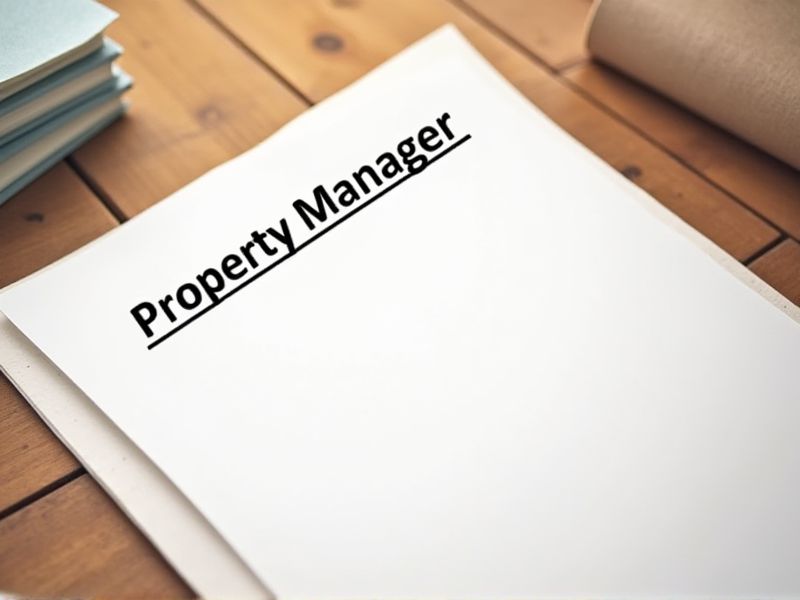
Real estate property managers are responsible for overseeing a wide range of tasks, from tenant relations to property maintenance, and proper certification ensures they are equipped with the necessary skills and knowledge. Certain certifications validate their expertise and ensure compliance with legal and industry standards, which can prevent costly mistakes and legal issues. These certifications also enhance credibility with property owners and tenants, fostering trust and confidence in their capabilities. Key certifications that may be required for a real estate property manager include the following.
Certified Property Manager (CPM)
Hiring a Certified Property Manager (CPM) enhances a property's financial performance due to their expertise in asset management and budgeting. They have comprehensive training, which leads to more efficient property operations and increased tenant satisfaction. Their certification ensures adherence to ethical practices, reducing the risk of legal issues. The CPM designation often attracts better quality tenants and investors, driven by the enhanced credibility and reputation it confers.
Accredited Residential Manager (ARM)
An Accredited Residential Manager (ARM) brings standardized skills and knowledge, increasing operational efficiency in property management. By adhering to industry regulations and ethical standards, they minimize legal risks for real estate properties. Their expertise in financial management ensures optimal budgeting and profitability. An ARM's proficiency in tenant relations enhances tenant satisfaction and retention rates.
Certified Manager of Community Associations (CMCA)
The Certified Manager of Community Associations (CMCA) ensures that real estate property managers have specialized knowledge in managing homeowner associations, which is critical for maintaining legal and financial compliance. Without a CMCA certification, property managers may lack the specific skills needed to address the unique demands of community associations. The certification acts as a benchmark for professionalism and competence, enhancing trust among board members and residents. Real estate managers with CMCA credentials are often more equipped to implement effective governance strategies, leading to improved community satisfaction.
Certified Apartment Manager (CAM)
Having a Certified Apartment Manager (CAM) boosts a property manager's knowledge and skills, directly leading to more efficient property operations. The CAM certification often results in increased tenant satisfaction due to the manager's enhanced ability to handle resident relations effectively. Achieving CAM status typically correlates with improved financial performance, as certified managers are better equipped to optimize budgets and maximize revenue. The program offers industry-specific training, which aligns managers with current best practices, ensuring compliance and reducing potential legal complications.
Residential Management Professional (RMP)
The presence of a Residential Management Professional (RMP) enhances a property manager's credibility, indicating a standardized level of education and training in real estate management. Holding an RMP designation means the property manager possesses up-to-date knowledge of local regulations and best practices. This certification often leads to improved tenant satisfaction, reducing turnover rates and vacancy periods. Property owners benefit as RMP-certified managers typically implement more efficient operational strategies, increasing overall investment returns.
Certified Commercial Investment Member (CCIM)
A Certified Commercial Investment Member (CCIM) designation enhances a real estate property manager's ability to make data-driven investment decisions, improving portfolio performance. The CCIM curriculum provides expertise in financial analysis, market analysis, and investment strategy, crucial for optimizing property assets. This designation builds trust with stakeholders and potential investors, who often seek managers with proven financial acumen. CCIM holders typically have access to a global network of professionals, facilitating better collaboration and market insights.
Real Estate Broker License
A real estate broker license ensures that a property manager understands and complies with real estate laws, reducing legal risks for clients. The license also enhances credibility, fostering trust with property owners and tenants. It provides the necessary knowledge in areas such as leasing, sales agreements, and contract negotiations. Licensed property managers often have access to a broader network and more opportunities within the real estate market.
Fair Housing Certification
Fair Housing Certification equips property managers with the knowledge to navigate and comply with laws designed to prevent discrimination in housing. By understanding fair housing regulations, property managers can decrease the risk of legal issues, which in turn protects both the property and its reputation. Certification can enhance the property manager's credibility, encouraging trust from both tenants and property owners. Fair housing training can lead to more inclusive communities, ultimately benefiting the wider housing market.
Certified Facility Manager (CFM)
A Certified Facility Manager (CFM) brings standardized expertise and advanced knowledge, which enhances operational efficiency in real estate properties. This certification signals an understanding of industry best practices, ensuring compliance with regulations and minimizing potential risks. Employing a CFM can lead to significant cost savings through optimized resource management and maintenance strategies. Consequently, properties managed by a CFM often experience greater tenant satisfaction and retention rates due to improved facility quality and service delivery.
OSHA Safety Certification
OSHA safety certification ensures real estate property managers are equipped to identify and mitigate workplace hazards, reducing injury risks. This certification fosters compliance with federal safety regulations, helping avoid legal liabilities and financial penalties. Enhanced safety standards achieved through certification improve tenant trust and satisfaction, potentially increasing property value. Trained managers can implement proactive safety measures, leading to a more secure environment for workers and residents alike.
Summary
By obtaining certifications, you, as a real estate property manager, can potentially increase your credibility and trust with clients. Enhancing your skills through these credentials may lead to improved efficiency in managing properties. This uptick in your capabilities can result in higher tenant satisfaction and retention rates. Consequently, your professional reputation and career opportunities might expand as a result of these certifications.
